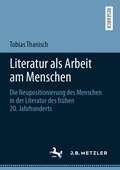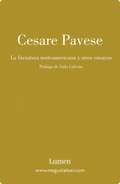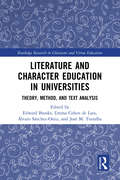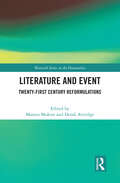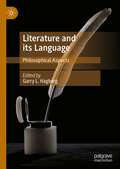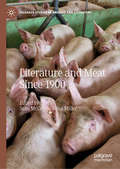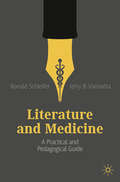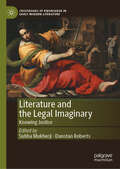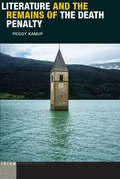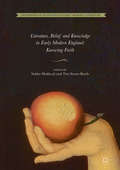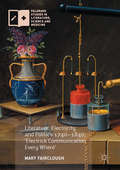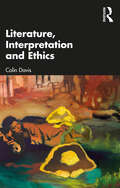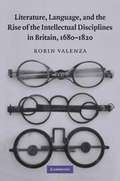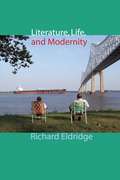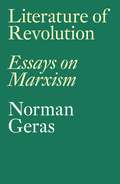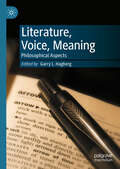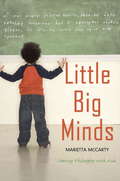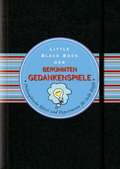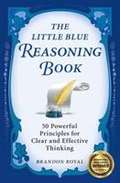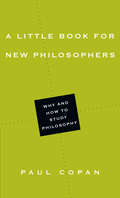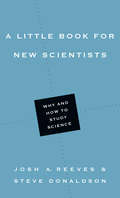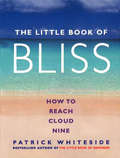- Table View
- List View
Literatur als Arbeit am Menschen: Die Neupositionierung des Menschen in der Literatur des frühen 20. Jahrhunderts
by Tobias ThanischDie zunehmende Ausdifferenzierung der Humanwissenschaften stellt zu Beginn des 20. Jahrhunderts das bisherige Bild des Menschen in Frage, ohne dabei ein konsistentes Folgekonzept liefern zu können. Als Reaktion auf diese unbestimmte Positionierung des Menschen entwerfen Autoren verschiedenster Strömungen eigene Konzepte eines „neuen Menschen“, an dessen Verwirklichung sie aktiv mitarbeiten. Die vorliegende Arbeit stellt anhand dreier Textbeispiele aus verschiedenen Nationalliteraturen unterschiedliche Konzepte vor dem Hintergrund philosophischer und wissensgeschichtlicher Zusammenhänge vor. Sie liefert damit auch einen Anknüpfungspunkt an aktuelle Konzepte des Post- und Transhumanismus.
La literatura norteamericana y otros ensayos
by Cesare PaveseCesare Pavese escribió estas palabras con solo diecinueve años, pero a lo largo de su vida no hizo más que confirmar esa pasión por la literatura. Su figura, contradictoria a veces y atormentada siempre, destaca con fuerza hoy, a los cien años de su nacimiento, aportando un rigor y una profundidad inusuales en estos tiempos.Los ensayos que componen el volumen, tanto si se ocupan de Faulkner y Dickens, como del concepto del intelectual políticamente comprometido o de las raíces del mito poético, brillan por su hondura y su lenguaje conciso y chispeante a la vez, descubriéndonos la faceta quizá menos conocida de uno de los maestros de la literatura europea contemporánea.
Literature After Darwin
by Virginia RichterWhat makes us human? Where is the limit between human and animal? These are questions that haunt post-Darwinian literature. Covering fiction from Kipling to Kafka, this study offers a historically embedded analysis of anthropological anxiety in the period between the publication of the Origin of Species and the beginning of the Second World War.
Literature and Character Education in Universities: Theory, Method, and Text Analysis (Routledge Research in Character and Virtue Education)
by Edward BrooksLiterature and Character Education in Universities presents the potential of literary and philosophical texts for character education in modern universities. The book engages with theoretical and practical aspects of character development in higher education, combining conceptual discussion of the role of literature in character education with applied case studies from university classrooms. Character education within the academic context of the university presents unique challenges and opportunities. Literature and Character Education in Universities presents perspectives from academics in Europe, the USA and Asia, offering unique insights into the ways that engaged reading and discussion of core texts can promote the development of intellectual and moral virtues. Chapters draw on a wide range of texts from Confucius’ Analects to J. D. Salinger’s The Catcher in the Rye, focusing on themes such as truthfulness, self-knowledge, prudence, tolerance, friendship, and humility. Literature and Character Education in Universities will be of real use to researchers, academics and postgraduates in the fields of higher education, philosophy, and literature. It should be essential reading for university educators interested in character development and advocates of literary education in modern universities.
Literature and Event: Twenty-First Century Reformulations (Warwick Series in the Humanities)
by Mantra MukimIf "event" is a proper name we reserve for monumental changes, crises, transitions and ruptures that are by their very nature unnameable or unthinkable, then this volume is an attempt to set up an encounter between such eventhood as it comes to have a bearing on literary works and the work of reading literature. As the event continues to provide a valuable analytical paradigm for work undertaken within the newer subdisciplines of literary and critical theory, including close reading, bio- politics, world literature, and eco- criticism, this volume makes a concerted effort to update the scholarship in this area and foreground the recent resurgence of interest in the concept. The book provides both a retrospective appraisal of the significance of events to literary studies and the literary humanities, as well as contemporary and prospective appraisals of the same, and thus would appeal scholars and instructors in the areas of literary theory, comparative literature and philosophical aesthetics alike. Along with a specialist focus on thinkers such as Derrida, Badiou, Deleuze and Malabou, the essays in this volume read a wide corpus of literature ranging from Han Kang, Homer, Renee Gladman, Proust and Flaubert to Yoruba ideophones, Browning, Anne Carson, Jenichiro Oyabe and Ben Lerner.
Literature and its Language: Philosophical Aspects
by Garry L. HagbergThis stimulating volume brings together an international team of emerging, mid-career, and senior scholars to investigate the relations between philosophical approaches to language and the language of literature. It has proven easy for philosophers of language to leave literary language to one side, just as it has proven easy for literary scholars to discuss questions of meaning separately from relevant issues in the philosophy of language. This volume brings the two together in mutually enlightening ways: considerations of literary meaning are deepened by adding philosophical approaches, just as philosophical issues are enriched by bringing them into contact or interweaving them with literary cases in all their subtlety.
Literature and Meat Since 1900 (Palgrave Studies in Animals and Literature)
by Seán McCorry John MillerThis collection of essays centers on literary representations of meat-eating, bringing aesthetic questions into dialogue with more established research on the ethics and politics of meat. From the decline of traditional animal husbandry to the emergence of intensive agriculture and the biotechnological innovation of in vitro meat, the last hundred years have seen dramatic changes in meat production. Meat consumption has risen substantially, inciting the emergence of new forms of political subjectivity, such as the radical rejection of meat production in veganism. Featuring essays on both canonical and lesser-known authors, Literature and Meat Since 1900 illustrates the ways in which our meat regime is shaped, reproduced and challenged as much by cultural and imaginative factors as by political contestation and moral reasoning.
Literature and Medicine: A Practical and Pedagogical Guide
by Ronald Schleifer Jerry B. VannattaLiterature and Medicine: A Practical and Pedagogical Guide is designed to introduce narrative medicine in medical humanities courses aimed at pre-medicine undergraduates and medical and healthcare students. With excerpts from short stories, novels, memoirs, and poems, the book guides students on the basic methods and concepts of the study of narrative. The book helps healthcare professionals to build a set of skills and knowledge central to the practice of medicine including an understanding of professionalism, building the patient-physician relationship, ethics of medical practice, the logic of diagnosis, recognizing mistakes in medical practice, and diversity of experience. In addition to analyzing and considering the literary texts, each chapter includes a vignette taken from clinical situations to help define and illustrate the chapter’s theme. Literature and Medicine illustrates the ways that engagement with the humanities in general, and literature in particular, can create better and more fulfilled physicians and caretakers.
Literature and the Legal Imaginary: Knowing Justice (Crossroads of Knowledge in Early Modern Literature #4)
by Subha Mukherji Dunstan RobertsTuning into the collective understanding of law as lived experience, Knowing Justice is a timely and distinctive intervention in the field of law and literature. It seeks to understand and inhabit the intersection between judicial procedure, legal thinking and imaginative practice, where epistemic processes that elude the formal discourses of law and legal history are generated and brought into view. But the law in early modern England – the focus of this book though not its horizon – was also an imaginative resource and a repository of structures of feeling. These are functions uniquely grasped through literary mediation because literature shares the representational modes and structures of law but not its methods or ends. Bringing together established and younger scholars from literary studies, legal history, theology and law, and employing a variety of approaches, this collection of essays eschews flat description in favour of layered analysis, cognisant of the plurality of concept, practice and representation. In using a literary lens, it treats apparent binaries or distinct registers as interlinked constituents of an ecology, and navigates the gap between abstract jurisprudence and the affective, composite, social event of justice or judgment. Its perception of ‘literature’, likewise, is capacious: including imaginative method, literary strategies used by law and its cognate disciplines, and hermeneutic and critical methods that are traditionally regarded as literary. Its notion of epistemology, meanwhile, encompasses not simply the condition of judicial knowledge but also its process, psychology and ethics: it attempts to know justice at the same time as it attends to what justice knows, fails to know, or resists knowing.
Literature and the Politics of Post-Victorian Decadence
by Kristin MahoneyIn Literature and the Politics of Post-Victorian Decadence, Kristin Mahoney argues that the early twentieth century was a period in which the specters of the fin de siècle exercised a remarkable draw on the modern cultural imagination and troubled emergent avant-gardistes. These authors and artists refused to assimilate to the aesthetic and political ethos of the era, representing themselves instead as time travellers from the previous century for whom twentieth-century modernity was both baffling and disappointing. However, they did not turn entirely from the modern moment, but rather relied on decadent strategies to participate in conversations concerning the most highly vexed issues of the period including war, the rise of the Labour Party, the question of women's sexual freedom, and changing conceptions of sexual and gender identities.
Literature and the Remains of the Death Penalty (Idiom: Inventing Writing Theory)
by Peggy KamufWhy have generations of philosophers failed or refused to articulate a rigorous challenge to the death penalty, when literature has been rife with death penalty abolitionism for centuries? In this book, Peggy Kamuf explores why any properly philosophical critique of capital punishment in the West must confront the literary as that which exceeds the logical demands of philosophy.Jacques Derrida has written that “the modern history of the institution named literature in Europe over the last three or four centuries is contemporary with and indissociable from a contestation of the death penalty.” How, Kamuf asks, does literature contest the death penalty today, particularly in the United States where it remains the last of its kind in a Western nation that professes to be a democracy? What resources do fiction, narrative, and poetic language supply in the age of the remains of the death penalty?Following a lucid account of Derrida’s approach to the death penalty, Kamuf pursues this question across several literary texts. In reading Orwell’s story “A Hanging,” Kamuf explores the relation between literary narration and the role of the witness, concluding that such a witness needs the seal of literary language in order to account for the secret of the death penalty. The next chapter turns to the American scene with Robert Coover’s 1977 novel The Public Burning, which restages the executions of Julius and Ethel Rosenberg as an outlandish public spectacle in Times Square. Because this fictional device reverses the drive toward secrecy that, beginning in the mid-nineteenth century, put an end to public executions in the West, Kamuf reads the novel in a tension with the current tendency in the U.S. to shore up and protect remaining death penalty practices through increasingly pervasive secrecy measures. A reading of Norman Mailer’s 1979 novel The Executioner’s Song, shows the breakdown of any firm distinction between suicide and capital execution and explores the essential affinity between traditional narrative structure, which is plotted from the end, and the “plot” of a death penalty. Final readings of Kafka, Derrida, and Baudelaire consider the relation between literature and law, showing how performative literary language can “play the law. “A brief conclusion, titled “Postmortem,” reflects on the condition of literature as that which survives the death penalty.A major contribution to the field of law and society, this book makes the case for literature as a space for contesting the death penalty, a case that scholars and activists working across a range of traditions will need to confront.
Literature, Belief and Knowledge in Early Modern England: Knowing Faith (Crossroads Of Knowledge In Early Modern Literature Ser. #1)
by Tim Stuart-Buttle Subha MukherjiThe primary aim of Knowing Faith is to uncover the intervention of literary texts and approaches in a wider conversation about religious knowledge: why we need it, how to get there, where to stop, and how to recognise it once it has been attained. Its relative freedom from specialised disciplinary investments allows a literary lens to bring into focus the relatively elusive strands of thinking about belief, knowledge and salvation, probing the particulars of affect implicit in the generalities of doctrine. The essays in this volume collectively probe the dynamic between literary form, religious faith and the process, psychology and ethics of knowing in early modern England. Addressing both the poetics of theological texts and literary treatments of theological matter, they stretch from the Reformation to the early Enlightenment, and cover a variety of themes ranging across religious hermeneutics, rhetoric and controversy, the role of the senses, and the entanglement of justice, ethics and practical theology. The book should appeal to scholars of early modern literature and culture, theologians and historians of religion, and general readers with a broad interest in Renaissance cultures of knowing.
Literature, Electricity and Politics 1740–1840: ‘Electrick Communication Every Where’ (Palgrave Studies in Literature, Science and Medicine)
by Mary FaircloughThis book investigates the science of electricity in the long eighteenth century and its textual life in literary and political writings. Electricity was celebrated as a symbol of enlightened progress, but its operation and its utility were unsettlingly obscure. As a result, debates about the nature of electricity dovetailed with discussions of the relation between body and soul, the nature of sexual attraction, the properties of revolutionary communication and the mysteries of vitality. This study explores the complex textual manifestations of electricity between 1740 and 1840, in which commentators describe it both as a material force and as a purely figurative one. The book analyses attempts by both elite and popular practitioners of electricity to elucidate the mysteries of electricity, and traces the figurative uses of electrical language in the works of writers including Mary Robinson, Edmund Burke, Erasmus Darwin, John Thelwall, Mary Shelley and Richard Carlile.
Literature, Ethics, and Aesthetics
by Sabrina AchillesA conceptualization of the literary aesthetic for a concern for the Self. Bringing Gilles Deleuze and Felix Guattari's constructivist thinking into a practical domain, Sabrina Achilles rethinks the ways in which literature is understood and taught.
Literature, Interpretation and Ethics
by Colin DavisLiterature, Interpretation and Ethics argues for the centrality of hermeneutics in the context of ongoing debates about the value and values of literature, and about the role and ethics of literary study. Hermeneutics is the endeavor to understand the nature of interpretation, as it poses vital questions about how we make sense of works of art, our own lives, other people and the world around us.The book outlines the contribution of hermeneutics to literary study through detailed accounts of role of interpretation in the work of key thinkers such as Martin Heidegger, Hans-Georg Gadamer, Paul Ricoeur, Umberto Eco, Jacques Derrida and Emmanuel Levinas. It also illustrates problems of interpretation posed by specific literary texts and films, emphasising how our interpretive acts also entail ethical engagements. The book develops a ‘hermeneutics of (guarded) trust’, which calls for attention to the agency of art without surrendering critical vigilance.Through a series of forays into theoretical texts, literary works and films, the book contributes to contemporary debates about critical practice and the cultural value. Interpretation, it suggests, is always fallible but it is also essential to our place in the world, and to the importance of the humanities.
Literature, Language, and the Rise of the Intellectual Disciplines in Britain, 1680–1820
by Robin ValenzaThe current divide between the sciences and the humanities, which often seem to speak entirely different languages, has its roots in the way intellectual disciplines developed in the long eighteenth century. As various fields of study became defined and to some degree professionalized, their ways of communicating evolved into an increasingly specialist vocabulary. Chemists, physicists, philosophers, and poets argued about whether their discourses should become more and more specialized, or whether they should aim to remain intelligible to the layperson. In this interdisciplinary study, Robin Valenza shows how Isaac Newton, Samuel Johnson, David Hume, Adam Smith, Samuel Taylor Coleridge and William Wordsworth invented new intellectual languages. By offering a much-needed new account of the rise of the modern disciplines, Robin Valenza shows why the sciences and humanities diverged so strongly, and argues that literature has a special role in navigating between the languages of different areas of thought.
Literature, Life, and Modernity (Columbia Themes in Philosophy, Social Criticism, and the Arts)
by Richard EldridgeRichard Eldridge explores the ability of dense and formally interesting literature to respond to the complexities of modern life. Beyond simple entertainment, difficult modern works cultivate reflective depth and help their readers order and interpret their lives as subjects in relation to complex economies and technological systems. By imagining themselves in the role of the protagonist or the authorial persona, readers become immersed in structures of sustained attention, under which concrete possibilities of meaningful life, along with difficulties that block their realization, are tracked and clarified. Literary form, Eldridge argues, generates structures of care, reflection, and investment within readers, shaping-if not stabilizing-their interactions with everyday objects and events. Through the experience of literary forms of attention, readers may come to think and live more actively, more fully engaging with modern life, rather than passively suffering it. Eldridge considers the thought of Descartes, Kant, Adorno, Benjamin, Stanley Cavell, and Charles Taylor in his discussion of Goethe, Wordsworth, Rilke, Stoppard, and Sebald, advancing a philosophy of literature that addresses our desire to read and the meaning and satisfaction that literary attention brings to our fragmented modern lives.
Literature of Revolution: Essays on Marxism
by Norman GerasThis influential collection explores the pivotal texts and topics in the Marxist tradition. Ranging over questions of social theory, political theory, moral philosophy and literary criticism, it looks at the thought of Marx and Trotsky, Luxemburg, Lenin and Althusser. Included here are Geras’s influential and widely cited treatment of fetishism in Capital, his comprehensive review of debates on Marxism and justice, discussions on political organization, revolutionary mass action and party pluralism, and a novel analysis of the literary power of Trotsky’s writing.
Literature, Voice, Meaning: Philosophical Aspects
by Garry L. HagbergThere has been a steady stream of articles written on the relations between conceptions of meaning and the interpretation of literature, but there remains a need for a book that both introduces and significantly contributes to an elucidation and understanding of the ways that voice and tone contribute to the determination of meaning. Only rarely have considerations of voice been brought together with considerations of meaning-determination (the work of Stanley Cavell, covered in one section of this book, is a leading example). This volume thus offers an analytically acute and culturally rich way of understanding how it is that we can productively think philosophically about meaning in language and literature in a more inclusive, expansive, and indeed human way.
Little Big Minds
by Marietta MccartyA guide for parents and educators to sharing the enduring ideas of the biggest minds throughout the centuries-from Plato to Jane Addams-with the "littlest" minds. Children are no strangers to cruelty and courage, to love and to loss, and in this unique book teacher and educational consultant Marietta McCarty reveals that they are, in fact, natural philosophers. Drawing on a program she has honed in schools around the country over the last fifteen years, Little Big Minds guides parents and educators in introducing philosophy to K-8 children in order to develop their critical thinking, deepen their appreciation for others, and brace them for the philosophical quandaries that lurk in all of our lives, young or old. Arranged according to themes-including prejudice, compassion, and death-and featuring the work of philosophers from Plato and Socrates to the Dalai Lama and Martin Luther King Jr. , this step-by-step guide to teaching kids how to think philosophically is full of excellent discussion questions, teaching tips, and group exercises. .
Little Black Book der Berühmten Gedankenspiele: Philosophische Rätsel und Experimente für helle Köpfe (Little Black Books (Deutsche Ausgabe))
by Martin CohenGedankenexperimente haben im Laufe der Jahrtausende eine entscheidende Rolle als Mittel der Wahl sowohl in der Philosophie als auch in der Naturwissenschaft gespielt. Im Gegensatz zu echten Experimenten kann im "gedanklichen Labor" auch Fragen nachgegangen werden, die man sonst nicht empirisch untersuchen kann (oder will). Gedankenexperimente lösen damit zwar sicher nicht die akuten Probleme der Menschheit, aber sie zeigen auf, wie schon leichte Veränderungen der Perspektive oder alltäglicher Grundannahmen zu verblüffenden Lösungen oder zu ganz neuen, spannenden Fragen führen können. Dieses Buch nimmt den Leser mit auf eine Reise durch alle Epochen philosophischen Denkens und stellt, in prägnanter Auflistung von A bis Z, 26 besonders interessante Gedankenexperimente berühmter Philosophen vor. Durchaus anspruchsvoll, aber doch sehr unterhaltsam geschrieben, lädt es nicht nur zum Lesen, sondern vor allem zum Miträtseln und philosophieren ein. Anschauliche, teils auch abwegige Beispiele aus den unterschiedlichsten Gebieten der Wissenschaft lassen keine Langweile aufkommen. Dazu gibt es Hinweise zur Durchführung eigener Gedankenexperimente und kurze Erläuterungen zu den wichtigsten der angeführten Denker von Aristoteles bis Wittgenstein.
The Little Blue Reasoning Book: 50 Powerful Principles for Clear and Effective Thinking
by Brandon RoyalThis guidebook addresses one of the most critical yet seldom taught skills. Reasoning skills help us make sense of the world, including how to better make decisions, tackle opportunities, evaluate claims, and solve problems. Interwoven within the book's five sections -- Perception & Mindset, Decision Making, Creative Thinking, Analyzing Arguments, and Mastering Logic -- reader's will discover 50 reasoning tips that summarize the common themes behind classic reasoning problems and situations. Appendixes contain summaries of fallacious reasoning, analogies, trade-offs, and a review of critical reading skills. A wealth of examples, charts, and insightful problems makes The Little Blue Reasoning Book an invaluable guide for any individual wanting to further sharpen his or her thinking skills.
A Little Book for New Philosophers: Why and How to Study Philosophy (Little Books)
by Paul CopanA Little Book for New Philosophers
A Little Book for New Scientists: Why and How to Study Science (Little Books)
by Josh A. Reeves Steve DonaldsonMany young Christians interested in the sciences have felt torn between two options: remaining faithful to Christ or studying science. Heated debates over the past century have created the impression that we have to choose between one or the other. The result has been a crisis of faith for many students. Josh Reeves and Steve Donaldson present a concise introduction to the study of science that explains why scientists in every age have found science congenial to their faith and how Christians in the sciences can bridge the gap between science and Christian belief and practice. If Christians are to have a beneficial dialogue with science, it will be guided by those who understand science from the inside. Consequently, this book provides both advice and encouragement for Christians entering or engaged in scientific careers because their presence in science is a vital component of the church's witness in the world.
The Little Book Of Bliss
by Patrick WhitesideHow would you like to be blissfully happy? Would you like a direct line to Cloud Nine?This pocket-sized volume is written by the author of the bestselling Little Book of Happiness - a trained psychiatrist with an understanding of Eastern wisdom. Full of practical tips and a zen-like simplicity, it contains all you need to know to get your life on track.
